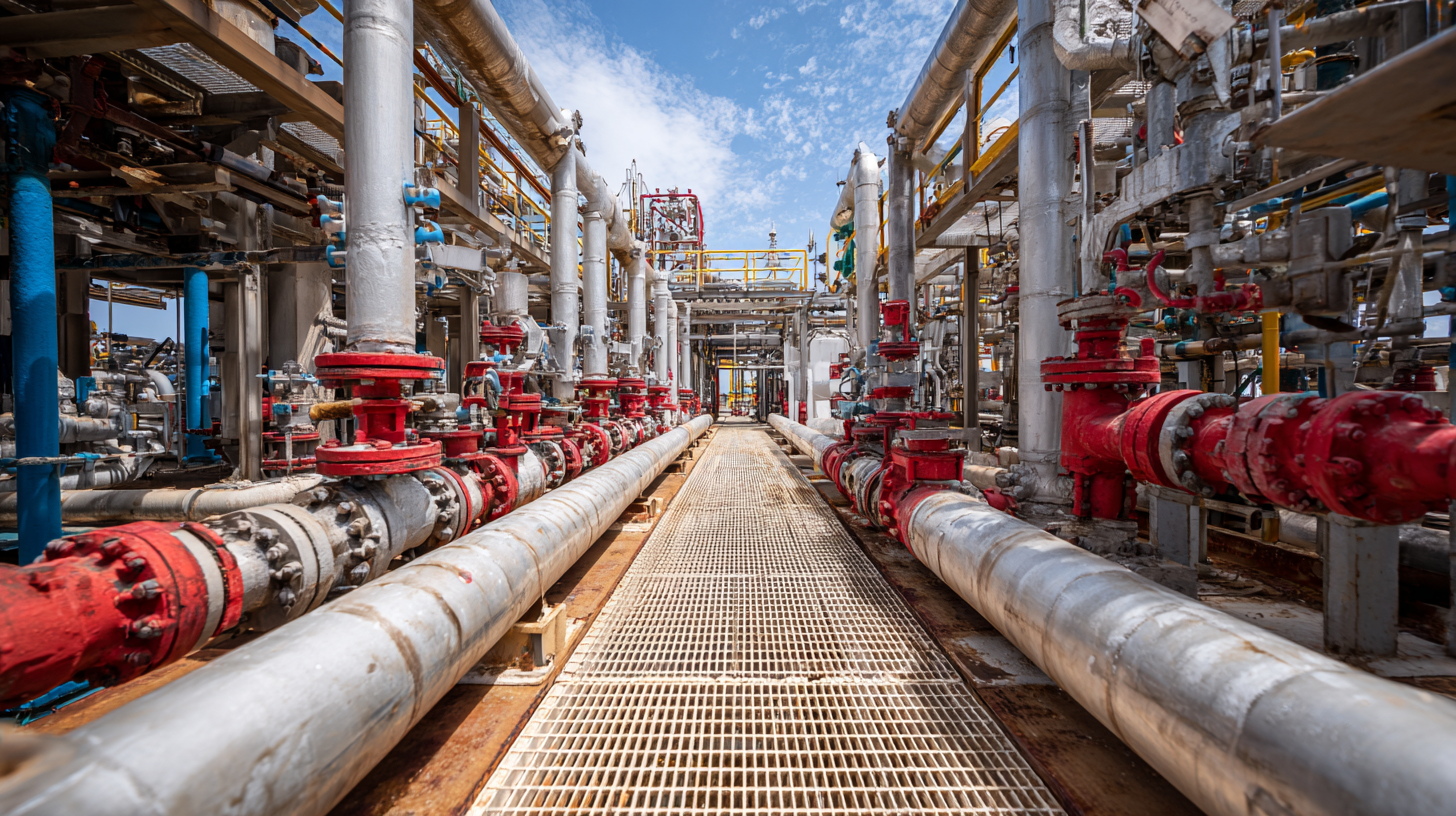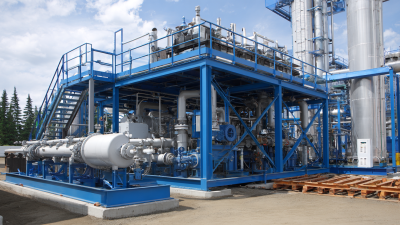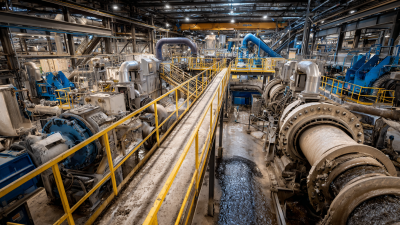strict management, quality first, quality service, and customer satisfaction


In today’s fast-changing world of oil and gas, finding ways to make engineering processes more efficient is more important than ever—after all, it can really boost profits. A report from the International Energy Agency pointed out that by adopting the latest tech in separation and filtration, companies could cut their operational costs by as much as 30%. That’s a huge difference! Leading the charge in these innovations is Shanghai Shangjiang Petroleum Engineering Equipment Co., Ltd. They’re all about creating and perfecting essential separation and filtration gear, especially cyclone separators. It’s clear they’re committed to pushing boundaries to help companies run smoother, waste less, and get more recoverable resources. By leveraging these high-tech solutions, engineers and operators can hit new levels of productivity and profitability—kind of setting a new standard in an industry that’s getting more and more competitive every day.

You know, automation has really become a game-changer when it comes to improving oil extraction. It’s all about making things more efficient and cutting down costs. Companies are now using cool tech like robotics, real-time data analysis, and machine learning to streamline everything—fewer humans needed on the ground, which not only reduces mistakes but also speeds up the whole process. Automated drilling systems and smart sensors keep a close eye on drilling conditions, so adjustments can be made on the fly to get better results.
Plus, automation isn’t just about cutting costs. It also helps with predictive maintenance—basically, catching equipment problems before they even happen. That means less downtime and lower repair costs. And since these systems can process huge amounts of data during extraction, companies can make smarter decisions about resource use and overall operations. All in all, adopting these automation tools isn’t just about saving money anymore; it’s about reshaping how we do oil extraction—making it more sustainable and viable down the road.

You know, in the fast-changing world of oil engineering, switching from old-school monitoring methods to digital tech really feels like a game-changer. Those traditional approaches often involve manually gathering and crunching data — which can be slow and, honestly, prone to mistakes. On the flip side, digital oil field monitoring uses real-time data analysis and IoT sensors, so decision-making becomes way more accurate and instant. This shift isn’t just about being high-tech; it actually helps keep things running smoothly and boosts profits too.
Here’s a little tip: try using real-time monitoring tools to keep an eye on your equipment and environmental conditions all the time. Being proactive like this helps catch issues early, which means less downtime and more savings in the long run.
Looking at both methods, it’s pretty clear that digital solutions give a full picture of what's happening across the board. This makes resource management a lot smarter and streamlines operations. Plus, with cool stuff like machine learning algorithms, operators can analyze huge amounts of data to do predictive maintenance — fixing problems before they turn into costly disasters.
And another tip: consider jumping on cloud platforms that store and analyze your data in one place. It makes collaboration easier, and your team can access info from anywhere — speeding up responses and helping with smarter planning.
Honestly, investing in digital isn’t just a trend anymore. It’s essential if you want to maximize efficiency and really boost your bottom line in oil engineering. It’s all about working smarter, not harder, right?
| Monitoring Technology | Initial Cost ($) | Maintenance Cost ($/year) | Data Accuracy (%) | Operational Efficiency Increase (%) | ROI Period (years) |
|---|---|---|---|---|---|
| Traditional Monitoring | 150,000 | 15,000 | 85 | 10 | 4.5 |
| Digital Monitoring | 200,000 | 8,000 | 95 | 25 | 3.2 |
| Hybrid Approach | 175,000 | 12,000 | 90 | 18 | 3.8 |
Enhanced Oil Recovery, or EOR, techniques are really becoming a big deal for oil engineers who want to squeeze out every bit of efficiency and profit from their reservoirs. You’ve got options like thermal recovery, gas injection, and chemical flooding — and honestly, each one has its perks. They can be tweaked based on the specific traits of the reservoir you're working with, which can make a huge difference in how well you pull oil out.
When you're diving into EOR options, it’s super important to think about whether it makes financial sense. A little tip? Do a thorough cost-benefit analysis to see which method lines up best with your reservoir’s unique features and the overall market situation. Also, bringing in advanced data analytics can be a game-changer — it helps you understand what's happening underground and make smarter decisions that ramp up production while keeping costs down.
And don’t forget about tech — cutting-edge tools are a must. For example, investing in real-time monitoring systems can really boost efficiency and help you react quickly to any changes in the field. By staying ahead of problems and adjusting your strategies on the fly, you can keep your recovery efforts both profitable and sustainable. These proactive steps don’t just improve oil output — they also give you an edge in today’s competitive market.

In today’s really competitive oil industry, it’s pretty much a must to benchmark what’s happening around the world with oil engineering practices. By looking at what the top companies are doing, organizations can spot where they might be falling behind and figure out how to do things better. This isn’t just about working more efficiently — it also helps boost profits because resources get used smarter and more effectively.
One tip that’s worked well for effective benchmarking is setting clear performance goals that match industry standards. Companies should compare their own numbers with those of the best performers out there, so they can see exactly where they’re lagging. Once you understand these gaps, it’s easier to focus on specific improvements, which can lead to big cost savings and better overall operations.
Plus, building a culture that pushes for constant improvement is super important. Encourage your teams to share what they’ve learned, whether from wins or setbacks. When everyone collaborates and shares insights, it often sparks fresh, innovative ideas for better resource management. And remember, it’s not a one-time thing; regularly revisiting and tweaking these practices based on global benchmarks will keep the oil engineering processes flexible, competitive, and profitable — even as the market keeps changing.
You know, in the oil industry, success really depends on how effectively companies can make use of data analytics. A McKinsey report points out that those who really leverage advanced data techniques can boost their operational performance by up to 20%. Basically, by digging into huge chunks of data from drilling, production, and supply chains, operators can actually get pretty valuable insights. These help them make smarter decisions—like better allocating resources or improving predictive maintenance. The result? Less downtime, lower costs, and generally a smoother operation.
And here’s the interesting part: bringing real-time data analytics into the decision-making process can massively cut down on risks. Deloitte did a study and found that companies adopting data-driven strategies often see productivity jump by about 5 to 10%. Plus, with machine learning algorithms hanging around, firms can actually predict when equipment might fail before it even happens, meaning fewer surprises and more consistent output. As the industry keeps evolving, getting a good grasp on how data analytics can fine-tune operations is going to be a game-changer for anyone wanting to stay ahead of the competition in this tough market.
So, in today’s oil engineering world, it’s pretty clear that understanding how environmental regs shake things up—both in terms of efficiency and profits—is a big deal. These rules kinda set the tone for how companies go about exploration and production, which can either make things smoother or throw a wrench in the works. For example, when stricter emissions controls come into play, companies often have to pour money into new tech. Yeah, it might bump up costs at first, but down the line, it could lead to savings through better energy use and fewer fines—so, a bit of a trade-off.
Tip 1: It’s smart to invest in tech that doesn’t just tick the boxes for today’s regs but also future-proof your operations. Thinking ahead like this can save you a headache later, especially when it comes to retrofitting or upgrades.
On top of that, companies are always walking a tightrope between sticking to environmental standards and keeping the money coming in. Miss the mark on compliance? That can mean hefty fines or penalties, which definitely eat into profits. The key here is to weave sustainability right into your core strategy—this way, not only do you protect your reputation, but you also make your company more attractive to investors.
Tip 2: It’s a good idea to have a dedicated team constantly keeping an eye on changing rules and tweaking practices accordingly. Staying proactive like this means you can better allocate resources and avoid sacrificing efficiency or profits just to stay compliant.
: Automation plays a critical role in optimizing oil extraction processes, enhancing efficiency, and significantly reducing costs through advanced technologies like robotics, real-time data analysis, and machine learning.
By streamlining operations and reducing human intervention, automation minimizes the risk of errors, accelerates production timelines, and enables predictive maintenance, which significantly cuts down on downtime and maintenance costs.
EOR techniques, such as thermal recovery, gas injection, and chemical flooding, are methods used by oil engineers to maximize extraction efficiency and profitability tailored to the specific characteristics of oil reservoirs.
Companies should conduct a detailed cost-benefit analysis of each EOR technique to determine which aligns best with their reservoir's profile and current market conditions.
Advanced data analytics provide insights into reservoir behavior, allowing companies to make informed decisions that boost output while minimizing costs.
Investing in real-time monitoring systems is crucial for enhancing operational efficiency and adapting to changing field conditions, ensuring recovery processes remain profitable.
Predictive maintenance is important because it helps anticipate equipment failures before they occur, which significantly reduces downtime and associated maintenance costs.
Automation not only cuts costs but also makes oil extraction processes more sustainable and economically viable, redefining the potential for future operations in the industry.
Quickly adjusting strategies based on real-time data helps oil engineers to stay ahead of challenges in the field, ensuring consistent profitability and optimized production.
Smart sensors provide precise monitoring of drilling conditions, allowing for immediate adjustments that enhance the overall outcome and efficiency of the oil extraction process.
When it comes to Oil Engineering, fine-tuning processes is absolutely key if we want to boost efficiency and make things more profitable. In this blog, we'll dive into some really important strategies — for instance, how automation is changing the game in oil extraction and how it can seriously cut costs. We’ll also compare old-school, traditional monitoring tech with the latest digital innovations, showing how these new solutions can really make operations smoother and more streamlined. On top of that, looking into different techniques for enhanced oil recovery can give us valuable insights on how to squeeze more profit out of our resources. And by benchmarking what's happening around the world, we can find ways to use resources more wisely and efficiently.
Plus, the role of data analytics in making smarter operational decisions is huge — it’s what helps companies stay ahead by making choices based on real insights. And finally, we’ll touch on how different environmental regulations around the globe can impact both the efficiency and profitability of oil projects. It’s clear that adaptability is more important than ever in this industry that’s always changing. At Shanghai Shangjiang Petroleum Engineering Equipment Co., Ltd., we’re continually working on improving separation and filtration tech, and these kinds of insights really help us stay focused on maximizing efficiency in the oil and gas world.






